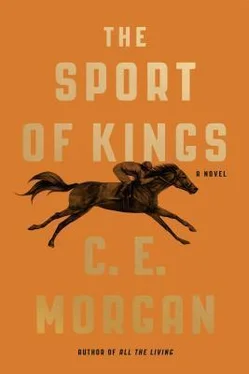The page read:
Forge Will: 23 September, 1827
Appraisal of Estate of Edward Cooper Forge, aged 54 years
One negro Man named Yearlye, $900
One negro Boy named Denis, $600
One negro Man named Benjohn, $1000
One negro Man named Scipio, $1000
One negro woman named Prissey, $500
One negro girl named Senna, $350
One negro woman named Phebe, $300
One negro Boy named Adam, $700
One negro Boy named Akin, $700
One negro Boy named Corey, $700
One negro Man named Prince Sr., $400
One crippled negro girl named Tilla, $100
In event of wife Lessandra Dear Dixon’s good health, the negro woman Prissey shall be returned to Stowne Farm of Fayette County, Kentucky, site of birth, along with son, Scipio, and his increase.
In event of wife Lessandra Dear Dixon’s decease, the negro woman Prissey shall bequeath to Richmond Cooper Forge with son, Scipio, and his increase shall remain at Forge Farm.
Beneath the names on the page, the ledger listed furniture: a walnut secretary purchased in Lexington, as well as a Hepplewhite cherry cupboard from Nashville. Then the page ended midappraisal, and there was nothing on the back of the page when she turned it, only the shadowy stamp of the words in reverse. She made a hasty copy of the page in her notebook.
By then the heat of the thing was threatening to scorch her fingers. What to do with this remnant of another century still hot enough to burn? Put it away. Which is exactly what she did. The names, whispering repeatedly out of the flames, were dampered by the closing book and then the black ledger was returned to the shelf, where she would soon forget about it entirely, this page from the history her family had made.
* * *
The whole thing had cast Jamie Barlow into a blue mood of remembrance — close kin to melancholy, but not exactly the same thing. Good grooms leaving the farm, Big Red being put down, the girl off in some foreign place for almost three weeks like she was finally grown and gone away for good. Then Mr. Forge’s foul mood while she was away. But especially the horse’s death. It sank his boat a bit, poked a hole in it at least. And being in the airport too, that turned up things he’d not thought of in a long while, of all those times he flew with the horses, though he’d always preferred to drive them. Those turboprops made him kind of uneasy, he wanted a little more plane between him and the ground. And, anyhow, he liked staying up all night with a thermos of coffee and a road map, the trailer thumping along behind the dually, the horses swaying in their sleep, off to Saratoga or Churchill Downs or back to the farm or wherever. But today was his last day — who would have thought Big Red would sign off on the very same day? He didn’t know whether that was an omen or what. He hitched his jeans, sat in one of the plastic airport seats, eyed the arrivals from Cincinnati. He took his hat from his head but neglected to run his fingers through his hair, so it suckered to his skull except for a gray ring that sprung up in a wave all the way around. He sighed. When a horse like that passes on … when you see all the best things go before you do … well, there’s a selfish part of you that wants to go first. He thought of Deena and then those old eyes sought out a flock of young girls prancing by with their high behinds and their ponytails swinging. It was a good enough day to retire, but it was odd. Off the farm, fetching the girl and all, not even rubbing the horses, not stomping the dirt. Deena was going to pass before him. In a million years, he would not have thought that would be so. He had smoked a lot of years, also drank quite a bit when he was young. He shifted, rolled his eyes around once like they were sore in their sockets, moved his hat from the empty seat on his right to the empty seat on his left. Ovarian cancer wrapped around the colon, stage IV with six months to live, the doctor said, and she’d reached out, hand on the doctor’s forearm the way Jamie had seen her do a thousand times with the boys to keep them peaceable, and saying, “It must be very hard for you to have to tell people these things.” Well. All in all, he’d been lucky, really lucky. And luck was all it ever was. Of the four girls, he’d asked the one with the biggest tits to dance, and it just so happened she was plucky and smart — always had been smarter than him. Helped bring his reading up to speed, so he could take the high school equivalency test, which, actually, he never bothered to do. But that was no matter at all. You rub horses, what do you need tests for? He nodded his gray head in unwitting pantomime of conversation. He didn’t even particularly like horses, he was just good with them. When the McCourys took him in, they’d always said, Send the Barlow boy, he’s able with a hoss, he don’t need no saddle nor string, the hosses is sweet on him. And all that. But you didn’t have to like a horse, just be good to it. Same with people. Here he’d been working for Mr. Forge for twenty years and he couldn’t say he cared for him, he just worked for him, and if there was one thing a person could say about Barlow, he was true. Loyal like no coon dog you ever had. With a will to work and the strength of a wheel hoss. He didn’t need good pay and didn’t ask for it when he deserved it, nobody got it anyway. All he needed was some old routine he was good at. You liked it or you didn’t, sometimes it rained, sometimes it poured — either way, you worked. You went on home for the things you liked. He liked Deena. He’d been a rough boy, he’d put sin to shame, and that was the truth. His parents had made him that way and that wasn’t an excuse the way young people always liked to make excuses nowadays, that was just the God’s honest truth. But Deena had changed him. He would have been ashamed to cuss or act big in front of her, the way he’d done before. At first he could barely say a word in her presence, just trying to refigure how to be, like learning to toddle and walk all over again, so he let her take the lead. Because he knew this: a good woman was sure to rub her goodness off on you if you let her, but there wasn’t enough angels in heaven to protect you if you rubbed your badness off on her. She’d turn it on you, she’d take up what was left of your own life and beat you with it, and an angry woman could do a sight more damage than any angry man he’d ever met. They used psychology on you. Deena had also brought him to Jesus, or at least in the vicinity, and made him want to learn and to be better and kind of chipper in his way. It got so he sometimes thought he’d always been good, always looked on the bright side, but no, that was her. And tough enough too. Here was a woman that got thrown from a horse onto her side and all she said was, “No, no, I’m all right, just let me soak in Epsom salts!” She’d refused to go to the doctor. She walked into the house on his arm and got all sunk down in the tub and it wasn’t until she passed out in the water that he finally took her to the hospital, where they said her leg was broken in two places. She wasn’t a crier, not really, not the sentimental type, though she was warm. It was Barlow who was the crier. Except when Deena went through the change, when she skipped her first month, she’d cried then. Four boys survived to be good men, religious men — except for one hellraiser just now in the process of coming around — and here she was crying, because she never got a girl of her own to raise up. She’d said some hard things that day, things that he would probably never forget. But she was a good person. He laced his sunspotted hands over his belly, closed his eyes. He thought of her on that long-ago day at the dance in her blue skirt and white blouse. Deena in the blue skirt and the white blouse was pretty much the chorus of his life. He recalled the little sweat stains he saw when he twirled her, how hard that had turned his dial. Someone had said once that you wanted a girl who could get good and wet and he’d had no idea what that meant at the time, he’d been so ignorant, but when he saw those stains under her arms, he went a little crazy on the inside. They sparked off each other the whole night at that dance. She wouldn’t let him do it to her until they were engaged, but when she’d finally let him, Lord, he’d taken no prisoners that night. Like a dog on a bone, he worked every angle he could think of. At one point, there had been so many arms and legs and whatnots pointing in so many different directions, it seemed like there were more than two people in that bed. “What are you trying to do to me?” she’d said, and she had laughed at him, and though a woman’s laugh could wreck a man, it wasn’t like that. Deena laughing was a good thing. It meant you were on your way, and sure enough, they were.
Читать дальше
Конец ознакомительного отрывка
Купить книгу












